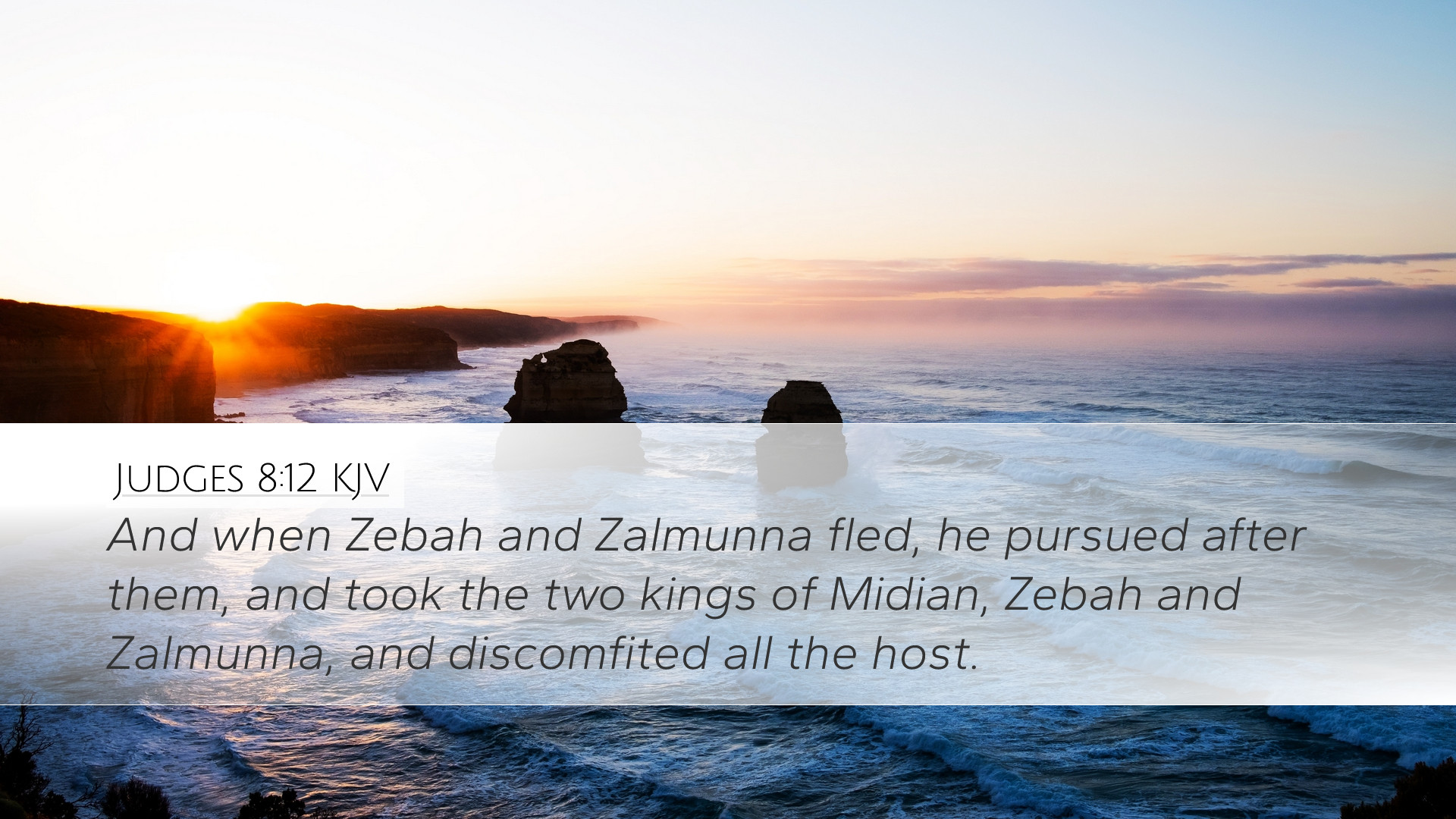Bible Commentary on Judges 8:12
Judges 8:12: "And when Gideon had smitten the host, he pursued after the Midianites, and took the two kings of Midian, Oreb and Zeeb; and he slew Oreb upon the rock Oreb, and Zeeb he slew at the winepress of Zeeb, and pursued Midian." (KJV)
Introduction
This passage from the Book of Judges presents a significant moment in the life of Gideon and highlights key themes of victory, divine assistance, and the nature of God’s chosen leaders. It captures the culmination of Gideon's battle against the Midianites and focuses on his commitment to pursue the enemy to the very end. In examining this verse, we reflect on insights provided by revered commentators such as Matthew Henry, Albert Barnes, and Adam Clarke. Their perspectives explore not only the historical context but also the theological implications of the events described.
Matthew Henry's Commentary
Context of the Conflict: Matthew Henry emphasizes the overwhelming nature of Gideon's victory, stating that the Midianite army, initially described as numerous as locusts (Judges 7:12), was dramatically defeated. Henry points out that this victory was not merely military but a demonstration of God's power to deliver His people. The mention of Oreb and Zeeb has symbolic significance, as their names mean " raven" and "wolf," which may represent the destructive and cruel nature of the Midianite oppression.
The Pursuit: According to Henry, Gideon's relentless pursuit of the Midianites serves as a model of diligence in spiritual warfare. Gideon's follow-through, despite a notable victory, showcases the importance of not becoming complacent. He captures Oreb and Zeeb, demonstrating that the task was not complete until the enemy was completely subdued. This pursuit reflects a deeper spiritual truth about the continued vigilance required in the life of faith.
Albert Barnes' Observations
Interpretation of The Kings' Fate: Albert Barnes elaborates on the significance of the deaths of Oreb and Zeeb. He notes that their demise serves not only as a military victory but also as a metaphor for the ultimate destruction of evil forces. By slaying these kings, Gideon symbolically represents the triumph of righteousness and divine authority over oppression and tyranny. Barnes draws attention to the locations of their deaths – "the rock Oreb" and "the winepress of Zeeb," indicating not just physical locations but also spiritual implications for both victory and judgment.
Theological Implications: Barnes further discusses the role of leadership in spiritual matters and how Gideon's actions reflect obedience to God’s commands. The passage reinforces the lesson that God empowers His chosen leaders and provides them with the resources necessary to carry out His will. Gideon’s leadership and bravery are contrasted with previous leaders, underlining the transition from Israel's cycles of apathy to a more engaged form of divine governance through appointed leaders.
Adam Clarke's Insights
Historical Context: Adam Clarke adds depth to the historical background of this text by pointing out the geographical and cultural elements influencing Gideon’s encounter with Midian. He details the significance of location in the defeat of the enemies, noting that winepresses were places of production and fertility and serve as a striking contrast to the devastation of war and the defeat of the oppressors in such a place.
Moral Courage and Divine Strength: Clarke emphasizes that Gideon’s success was not solely due to military strength but rather the divine support of God. He argues that this verse exemplifies how God equips those He calls, bestowing them with both the courage necessary to confront their enemies as well as strategic wisdom to execute God’s plan. Clarke's commentary stresses the importance of moral integrity and dependence on God in leadership.
Applications for Modern Readers
This passage offers rich insights applicable for pastors, students, theologians, and scholars alike. Key themes include:
- Persistence in Adversity: Just as Gideon pursued the Midianites, modern believers are encouraged to pursue their spiritual goals and resist the adversities they face.
- Completing God's Work: The necessity of following God's directives to completion, ensuring all aspects of spiritual tasks are addressed.
- Trust in Divine Resources: A reminder to rely on divine strength rather than personal ability alone when engaging in spiritual pursuits.
- The Celebration of Victory: Understanding that victories in faith are part of a larger narrative of God’s redemptive plan for His people.
Conclusion
Judges 8:12 serves not only as a historical account but also as a source of instruction for believers today. The accounts of Gideon’s actions and the symbolic victories over Midian exemplify the broader themes of God’s sovereignty, the importance of faithful leadership, and the continual need for spiritual vigilance. Commentaries by Henry, Barnes, and Clarke provide invaluable perspectives that enrich our understanding and guide our applications of these ancient texts in contemporary life.


